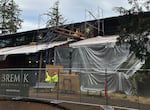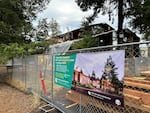Portland voters may be willing to increase property taxes to maintain city parks, according to a new poll commissioned by the city.
The July survey, conducted by FM3 Research, found that a majority of polled Portland voters would vote to boost the rate of the city’s current five-year tax levy to maintain Portland Parks and Recreation’s services.

Construction workers work on the Mount Scott Community Center pool house in Southeast Portland, Ore., Tuesday, Aug. 27, 2024.
Bradley W. Parks / OPB
The city parks levy, passed in 2020, currently places a tax of $0.80 per $1,000 assessed value of a property. For example, the owner of a home with a median assessed value of $228,000 -- the average for a Multnomah County home -- pays $182 per year.
The FM3 poll proposes increasing that tax from $0.80 to $1.60 if the levy is renewed in 2026. Nearly 65% of the 664 voters polled supported this plan. Because of these results, the survey’s authors said they believe a levy increase would be “viable” if placed on a May 2025 ballot.
Voters were slightly less inclined to back an alternative proposal, which was first reported on by the Oregonian/OregonLive. That “parks and arts” levy would increase the tax to $1.80 and use some of the funds to cover city arts programs. In this scenario, Portland would also do away with the city’s oft-lamented arts tax, replacing it with this combined fund. Only 61% of voters polled backed this idea.
This is just the latest pitch to boost taxes to keep the city’s parks bureau afloat. The city department has faced revenue shortfalls for years, which were worsened by the city having to shutter community centers and pools during the COVID-19 pandemic and forgo user fees.
The budget crunch has delayed critical maintenance projects at city parks and facilities that the city estimates would cost over $600 million to repair.
Earlier this year, City Commissioners Dan Ryan and Rene Gonzalez floated a plan to create a new property tax that would jointly fund the parks bureau and Portland Fire & Rescue.
At the time, a poll found that 62% of voters would pass this joint property tax. But the commissioners dropped the idea amid concerns that the region’s growing tax burden is deterring businesses from investing in Portland.
That concern was reflected in the latest parks levy poll. Of those surveyed who opposed the levy increase, nearly 70% said their decision was due to wanting “no new taxes.”
It’s not clear whether elected officials feel the same.
What is clear: Mayor Ted Wheeler doesn’t want this City Council to make any decision to refer the tax to voters. Due to the city’s shifting government structure, the current council will disband at the end of the year, making way for a new 12-person council in January.
Through a spokesperson, Wheeler said that the new council should approve tax requests that need voter approval. Portland City Council must refer a ballot measure at least 81 days before an election, giving the new council about a month to decide whether to advance it to a May ballot.
If the levy increase is approved in 2025, it would largely serve to maintain the current level of services and programs offered by Portland Parks & Recreation. If the levy is renewed at the same $0.80 rate in 2026, the parks bureau estimates needing to cut those services by 25%.

Construction workers work on the Mount Scott Community Center pool house in Southeast Portland, Ore., Tuesday, Aug. 27, 2024.
Bradley W. Parks / OPB
